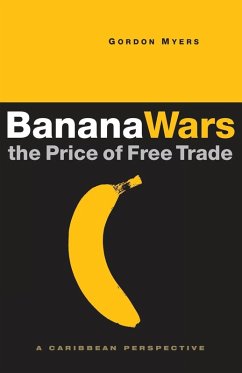Bananas are taken for granted today as part of the diet of ordinarypeople in industrial countries. In the Windward Islands of the Caribbean,bananas provided around one-third of all jobs and half their export earnings -until recent WTO rulings began to undermine the industry. Much of this tradeand employment has now disappeared as a result of these rulings; and at the endof 2005, the EU is due to give up the last non-tariff measures designed toenable this trade to continue. Unemployment, poverty, and further emigrationtherefore loom over these islanders, or the tempting alternative of growing andtrading in illegal drugs. And all because WTO rules take too little account ofthe problems of tiny island economies and the human cost of rigid applicationof global free-trade rules.
In this absorbing history, Gordon Myers tells theextraordinary story of how the US government, in response to grievances of oneAmerican corporation, led the World Trade Organisation to nullify a EuropeanCommunity commitment to protect the livelihood of small Caribbean bananagrowers. The WTO's own working practices also emerge as inflexible and myopic.
The story illustrates the inadequacy of an internationaltrading system dominated by free-trade ideology but lacking the flexibility necessaryto enable very small and highly vulnerable states, like the Windward Islands,to receive the protection that they need in order to survive. Moreover,increasingly powerful supermarket chains are able to exploit this free-tradeframework to insist on ever lower prices, to the short-term benefit ofconsumers but the serious detriment of growers in the developing world.
This book is a call for new arrangements in the EU that willenable the Caribbean banana industry to survive beyond 2005, and for an outlookin the WTO that gives greater consideration to the needs of very small stateswith vulnerable economies.
In this absorbing history, Gordon Myers tells theextraordinary story of how the US government, in response to grievances of oneAmerican corporation, led the World Trade Organisation to nullify a EuropeanCommunity commitment to protect the livelihood of small Caribbean bananagrowers. The WTO's own working practices also emerge as inflexible and myopic.
The story illustrates the inadequacy of an internationaltrading system dominated by free-trade ideology but lacking the flexibility necessaryto enable very small and highly vulnerable states, like the Windward Islands,to receive the protection that they need in order to survive. Moreover,increasingly powerful supermarket chains are able to exploit this free-tradeframework to insist on ever lower prices, to the short-term benefit ofconsumers but the serious detriment of growers in the developing world.
This book is a call for new arrangements in the EU that willenable the Caribbean banana industry to survive beyond 2005, and for an outlookin the WTO that gives greater consideration to the needs of very small stateswith vulnerable economies.
'...a lucid and detailed history of the banana trade in the Caribbean region...buy 'Banana Wars' , buy free trade bananas, buy organic bananas and buy Windward Island bananas.' Tribune, June 2005 'Gordon Myers has written with clarity, sensitivity, and wisdom, a story of life and production for the people of the Caribbean who have been engaged in the banana business for over one hundred years. His is a remarkable book. It covers a critical productive sector, bananas, part of the economic base which sustains our evolving Caribbean civilisation.' The Honourable Ralph E. Gonsalves Prime Minister of Saint Vincent and the Grenadines, 2001 'Gordon Myers' expertise on the banana issue is well known. However his account of the Caribbean banana farmers' continuing struggle to survive eloquently reveals both his commitment and his concern. Current debates about world trade and unfettered liberalisation should be informed by the history of how livelihoods in the Caribbean have been destroyed, by decisions taken thousands of miles away in the US, in the EU and at the WTO. I commend The Banana Wars to all those who subscribe to the view that vulnerable banana producers need protection. The alternative is massive rural unemployment and a fall in national income levels. Unrealistic calls for diversification and restructuring should take into account the specific difficulties faced by traditional banana farmers in the Caribbean. With the prospect of enlargement of the European Union and the imminent inclusion of ten new member states, we have to protect the markets of Europe's traditional banana suppliers.' Glenys Kinnock MEP 'Gordon Myers has written a thoroughly researched and very readable book, tracing the history of the banana as a commercial crop and placing it in the socio and political context of the Caribbean and Latin America. Its publication is both timely and relevant in the face of the global trade negotiations now in progress, and should be compulsory reading for all those in the Third World now engaged in these negotiations.' Sir John Compton, Prime Minister of St Lucia 1982-1996

